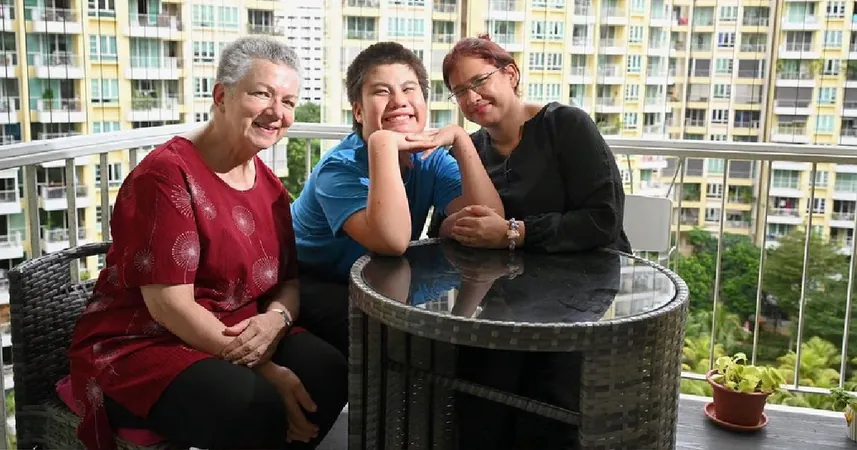
The Unseen Battles of Prader-Willi Syndrome: A Constant Hunger for Life
2025-01-26
Author: Wei Ling
SINGAPORE - In a world where teenagers often grapple with rapid growth spurts and insatiable appetites, two local youths, Teo Zi Yee, 17, and David Lucas Soo, 13, face an unimaginable challenge: a relentless hunger that gnaws at them endlessly due to a rare genetic condition known as Prader-Willi Syndrome (PWS).
Understanding Prader-Willi Syndrome (PWS)
PWS is a complex neurodevelopmental disorder caused by a malfunction in the genetic material inherited from the father. This condition prevents the brain from signaling when the body is full, leading to an unending urge to eat. The consequences of this uncontrollable hunger can be severe, as overeating leads to rapid weight gain and subsequent morbid obesity. Associate Professor Angeline Lai from KK Women's and Children's Hospital (KKH) warns about associated health complications such as obstructive sleep apnea, diabetes, hypertension, and high cholesterol, all of which are directly linked to obesity.
"The severity of obesity in individuals with PWS can vary; it largely depends on how strictly their food intake is managed. Some parents have to go as far as locking the kitchen or pantry to manage their children's excessive eating behavior," explains Prof. Lai. Early diagnosis is crucial, as it allows parents to instill healthy eating habits from a young age, potentially mitigating the risk of obesity.
A Spectrum Disorder with Varied Challenges
PWS is a spectrum disorder, which means that not everyone with the condition will experience the same symptoms or challenges. This genetic peculiarity can lead to various physical, cognitive, and behavioral difficulties, including developmental delays and sleep disorders. While some children with PWS can thrive in mainstream educational settings, others may require special education support.
The Global PWS Registry estimates that this syndrome affects one in 10,000 to one in 30,000 births, with an equal prevalence across genders and ethnicities. KKH reports diagnosing one to two new cases of PWS annually and boasts the only lab in Singapore capable of genetic testing for this syndrome.
Managing Prader-Willi Syndrome with Treatment
To help manage the physical challenges faced by these children, growth hormone treatment is prescribed, which can contribute to improved height, increased muscle mass, and reduced fat accumulation. Prof. Lai emphasizes that beginning treatment early, combined with strict dietary control, may prevent obesity and improve overall health outcomes.
Personal Stories of Teo Zi Yee and David Lucas Soo
Teo Zi Yee's journey began with concerning symptoms at birth; she displayed low muscle tone and an unusual lethargy. After a sleepless night filled with anxiety, her parents sought medical advice, which led to a diagnosis of PWS. The subsequent months were a whirlwind of medical adjustments, including tube feeding due to her inability to suck and swallow properly.
Both parents have expressed how this journey has transformed their perspectives on parenthood. “Having Zi Yee changed a lot of our expectations. In the beginning, we experienced moments of despair asking 'why us?' But we've learned to accept her unique challenges and cherish her strengths,” her mother, Lynn Er, shares.
Like many kids with PWS, Zi Yee has faced physical limitations and health issues, including scoliosis and delayed milestone achievements. Nevertheless, she is on a growth hormone regimen, which has allowed her to make some progress. Regular check-ups at KKH ensure that her health remains monitored, especially following incidents such as severe dehydration, which can occur without warning in children with PWS.
On the other hand, David Soo, who was diagnosed at just nine months old, presents a contrasting picture. His grandmother shares how he was fortunate to be able to feed himself but struggles with his increasing appetite as he enters puberty. “Previously, we could manage his intake, but his drive for food seems stronger now,” she says.
David, who requires speech therapy and attends a special-needs school, finds joy in family activities and loves to engage in conversations. His mother has emphasized the importance of maintaining a structured diet while also involving him in extracurricular activities to manage his weight effectively.
Challenges of Adulthood with PWS
Experts highlight that the challenges of PWS extend beyond childhood. As individuals with the syndrome grow into adulthood, they are often confronted with a multitude of health risks associated with obesity, which contributes to higher mortality rates. Initiatives like adult group homes tailored to individuals with PWS may be beneficial, as many cannot live independently due to their dietary needs and require supervision.
Building a Supportive Future
Ultimately, both families have set up trust funds for their children to ensure a secure future. The challenges they face are compounded by the need for understanding and support from society at large, including adjustments in public facilities and insurance coverage for ongoing medical treatments.
The stories of Teo Zi Yee and David Lucas Soo serve as powerful reminders of the resilience and courage exhibited by families grappling with rare conditions like Prader-Willi syndrome. By raising awareness, we pave the way for a more inclusive society that embraces and supports individuals with unique needs.



 Brasil (PT)
Brasil (PT)
 Canada (EN)
Canada (EN)
 Chile (ES)
Chile (ES)
 Česko (CS)
Česko (CS)
 대한민국 (KO)
대한민국 (KO)
 España (ES)
España (ES)
 France (FR)
France (FR)
 Hong Kong (EN)
Hong Kong (EN)
 Italia (IT)
Italia (IT)
 日本 (JA)
日本 (JA)
 Magyarország (HU)
Magyarország (HU)
 Norge (NO)
Norge (NO)
 Polska (PL)
Polska (PL)
 Schweiz (DE)
Schweiz (DE)
 Singapore (EN)
Singapore (EN)
 Sverige (SV)
Sverige (SV)
 Suomi (FI)
Suomi (FI)
 Türkiye (TR)
Türkiye (TR)